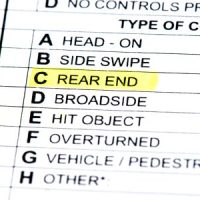Police Accident Reports Can Help, But Can’t be Used in Your Trial

Let’s say that you are in an accident, and there is a dispute over who is liable for the accident. The other driver is saying you’re liable—but lucky for you, the police report made at the scene of the accident by the responding police officer clearly says that the other driver is the one at fault.
Game over, right? The police report will show the world that your version of the story is correct, and that you are in fact the victim, and you did not cause the accident.
No Use in Trial
Except for one problem: in Massachusetts, the police report is not admissible evidence in your injury case. That’s right; at your personal injury trial, your attorney won’t be able to show the jury the report, the jury won’t ever see the report, and the report can’t be considered as evidence.
This seems unfair; police officers are generally trustworthy and accurate—why wouldn’t we want to use their police report?
They’re Just Too Good
The answer is because police officers are actually too trustworthy.
The problem is that if the jury were to see the police report, it would be so persuasive, and the jury would give it so much weight, out of respect for law officers, that the jury likely would not consider any contradictory evidence. The party that the police officer found to be at fault, could almost never win the case, because the jury would give the police report that much credibility.
There are also hearsay problems, assuming the officer is not in court to testify, as they rarely are.
Additionally, we cannot just assume the police report is true. Police officers do their best at the scene of an accident, but their job is not to conduct a trial and hear evidence at the scene of an accident. A police officer is not a judge or jury. That means that the officer’s finding is only his or her observations based on some preliminary questioning and observations.
Still Some Good Uses
But all of this doesn’t make the police report irrelevant or not useful.
Before your trial, the insurance company for the other side will consider the police report, in determining whether to offer you a settlement, and how much to offer. The fact that the report backs up your version of the accident, can be very persuasive in getting the other side to settle your case.
The police report often has the names and contact information of passengers, bystanders and witnesses, all of whom may have important information about the accident.
And although the police report can’t be used in trial, the police officer can refer to the report to help him remember your accident, in the event that the officer is called to testify—and yes, the officer’s direct testimony is allowed in trial.
Call our Boston personal injury lawyers at The Law Office of Joseph Linnehan, Jr. today at 617-275-4200 if a loved one has been injured in any kind of accident for help with your injury trial.
Source:
mass.gov/doc/motor-vehicle-crash-operator-report/download
